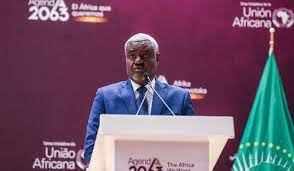Latest estimates show that the continued dependence on external partners for program budget and peacekeeping operations defeats the Johannesburg decision by the continental body to achieve 75%, and 25% member states funding.
During the four-day retreat facilitated by the African Union Commission, participants will also consider the progress on the division of labour between the African Union, regional economic communities, regional mechanisms and member states.
The implementation of the second decade of Agenda 2063 will be focused on acceleration, building on the first decade that focused on convergence, it said.
Speaking at the opening session of the retreat, Moussa Faki Mahamat, Chairperson of the African Union Commission lauded the progress of the reforms underscoring its relevance in repositioning the organisation to deliver on the vision for an integrated, prosperous and peaceful Africa, driven by its own citizens and representing a dynamic force in the global arena.
He noted some of the achievements of the reforms highlighting, among others, the departmental structure of the AU Commission; the transformation of the NEPAD into the African Union Development Agency (AUDA-NEPAD) with an expanded mandate.
Among other achievements highlighted, it includes the expanded mandate of the African Peer Review Mechanism (APRM); the implementation of the decision on financing the union for self sufficient financing through domestic resources including the peace fund, as well as the enhanced budgeting process.
The report from the retreat will be considered in the processes of the AU Policy Organs before being presented for consideration by the Assembly of Heads of State and Government, it said.
CU/as/APA
|
ReplyForward
|


